
Imagine you read a piece of shocking news in a newspaper. The news is so shocking that you doubt its credibility. What’s the first factor you’d take into account to accept or reject the news?
Let me guess. The trustworthiness of the newspaper?
Stick with me. Now, let's break down what constitutes the trustworthiness of the newspaper in your perception?
- Is it the reporter who broke the news?
- Is it the past track record of the newspaper?
- Is it the reputation attached to the newspaper for years?
The answer is all of the above. As a reader, before coming to a conclusion, you’ll run a credibility check on the newspaper in your mind. The process involves taking a variety of factors into account.
The same is the case with Google when it ranks pages in the SERP against queries. A search engine like Google puts a lot of factors into context when determining how authoritative a source (website) is on the internet for a particular topic and those with higher topical authority are benefitted as a result.
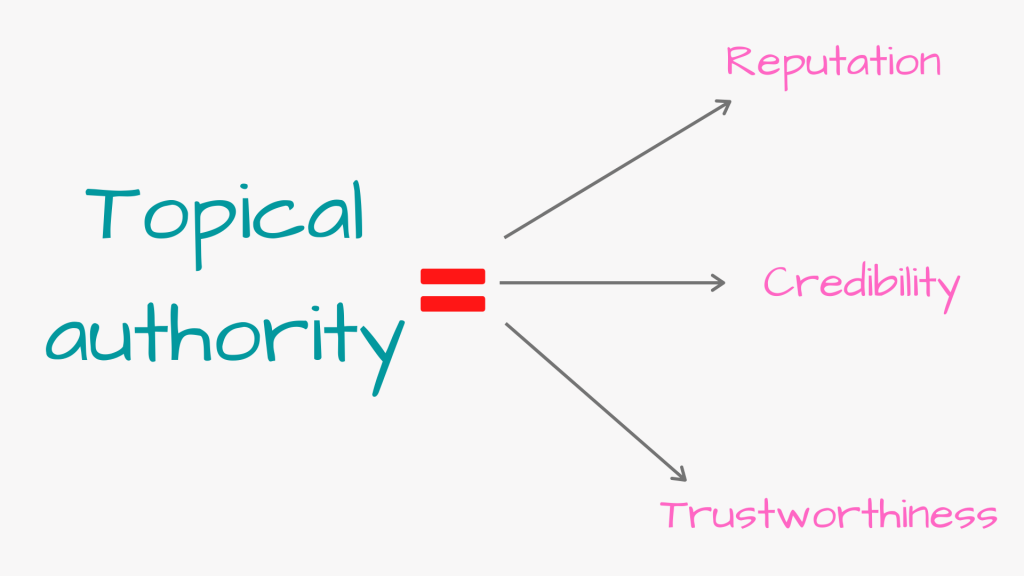
The next question that arises now is, how can you demonstrate to Google that your website indeed holds the authority it needs to rank for specific keywords?
Before we jump into that, let's start with the fundamentals.
What is topical authority?
Topical authority is a website’s authority in any particular niche or domain, as perceived by search engines, based on the website’s content and a variety of trust signals.
To make it crystal clear, imagine two websites:
- Website A covers ‘Technology & machines’ as a subject
- Website B covers ‘Cars’ as a subject
For a search engine like Google, website B will be perceived as a more credible source of information to fulfill the search intent attached to anything specific to cars, since website A touches on a broader set of topics and is perceived as more of a generalist.
Now, performance-wise, with everything else considered equal, for queries specific to ‘Cars’ website B has more chances to outrank website A.
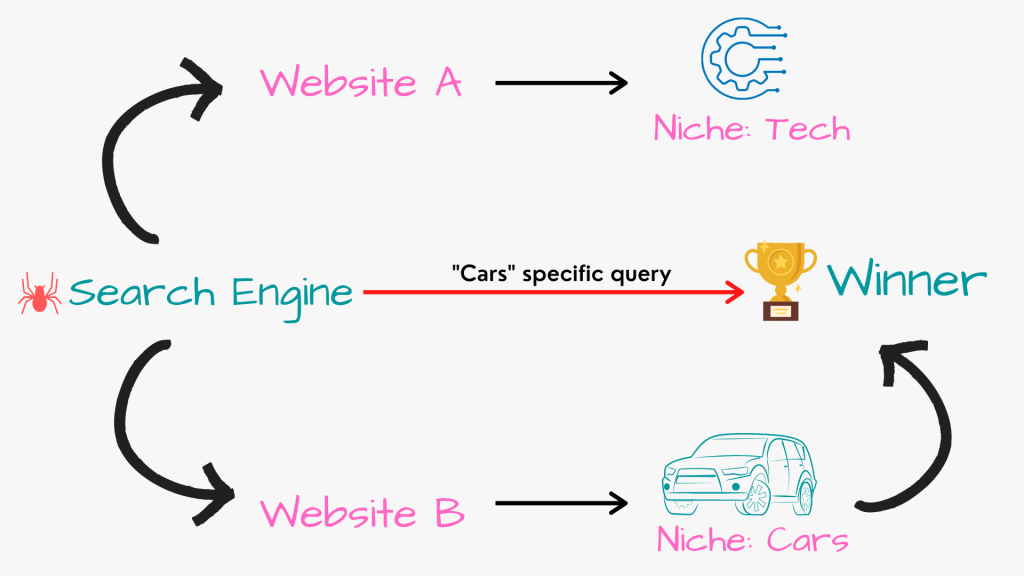
The fundamental idea is that a search engine like Google will understand that your website is an authoritative source of information in particular subjects and thus rank your web pages higher for queries falling within the scope of those subjects.
Why is topical authority important?
The question now is, why should you care about topical authority? Well, there are a few great reasons why:
It resonates with Google’s clustering algorithm
A fundamental understanding of how Google works is essential to comprehend the concept of topical authority. Although I nerd out hard on Google’s algorithm patents, I’ll avoid getting into unnecessary technical details.
Google builds a semantic network of the pages it crawls on any domain and puts them into different topically related categories. This builds, what’s called, a ‘category cluster’. The maturity of a cluster (in terms of topical coverage) would determine how valuable it’d be considered by the search engine.
One major component of the clustering algorithm, called ‘Publisher’ is responsible for deciding if a cluster is matured enough to be used for answering queries in the SERP. And if that is the case, the outcome is higher rankings for your website.
So in your pursuit of developing topical authority, you’re facilitating Google in the way they structure, store and present the information extracted from your website.
Beat the giants in SERP
Leveraging topical authority is the best way to outrank the whales in your industry. Building trust for Google in your website’s expertise among specified topics will make it outrank websites that tend to cover a larger bubble in their content.
I’ve seen this happening countless times and there are tons of case studies on this. In fact, I personally have utilized topical authority to beat websites like Hubspot at topics that come in handy to them:
Expand the pool of your keyword rankings
Probably the most rewarding outcome of developing topical authority on your website is the expansion of the set of ranking keywords.
The development of topical authority is dependent on the scope of topical coverage on your website, and as that scope expands, it helps not just individual pages to rank better but also those pages to supplement each other’s ranking capability at the same time.
This means, that the pages when set under a web of topic clusters will do better collectively than they'd individually. For your website, this means the acquisition of additional traffic.
Strengthen your chances of sustaining rankings
I’d argue that the harder part of SEO is not attaining rankings but sustaining them. If you're tracking rankings precisely you'll notice that even if you’ve successfully ranked for competitive terms, your competitors will be coming for the top spot all the time.
By strengthening your website around specific topics, your chances of holding onto those achieved rankings are stronger than usual. The bond of the topically clustered pages will strengthen each other’s ability to rank and thus will be tough to beat as a group.
Topical authority vs domain authority
Another type of ‘authority’ you must have heard of in the SEO community is the ‘Domain authority’.
The main difference is that topical authority refers to the credibility of your website based on content wellness, while domain authority is the credibility based on the backlink’s strength.
The more important question is: how do domain authority and topical authority compare, and which one to focus on?
Which should you focus on?
In general, your focus should be on both of them since they can be used together for organic growth.
Practically speaking, you should be putting out perfectly crafted content and building links consistently to supplement the authority and relevancy required for your website to grow organically. In an ideal scenario, neither of the two should be compromised because of the other.
How do these two compare?
Although my position remains the same (that both are important), still in a head-to-head objective comparison I’d say topical authority beats domain authority.
The sole reason is the fact that you can’t benefit from links (domain authority) if you don’t have any content to point those links to. However, you can definitely leverage content mapping (topical authority) for organic performance, even without backlinks sometimes.
4 tried & tested ways to develop topical authority
When it comes to building topical authority there are various practices being followed, however, at the core, all of it comes down to a few fundamentals.
Here in this piece, we might not be able to cover the details, but will definitely touch on each of those fundamental ideas from a broader perspective.
NOTE: Before anything, your first step should be to ensure your website is technically sound. This isn’t exactly a practice that has to do with topical authority. However, the outcome will be enhanced provided that your website has no technical SEO errors like index bloating and improper redirects, etc.
1. Holistic topical coverage
Topical authority is all about content. But there’s a caveat to it: the content should cover the topic that you aspire to build authority around, in a universal manner.
There can be various methods for you to cover a topic holistically. The techniques can start from finding keywords around a head term and can go as advanced as using Google’s knowledge graph API via python for entities extraction.
However, believe me, for the most part, you don’t need any technical knowledge to leverage topical authority. If you’re a beginner to intermediate in SEO all you need is to think:
“What are all of the valuable questions around this topic that I can possibly answer?”
From there on, you can deploy a few keyword/research practices to cover that topic holistically. Let’s take the example of a topic like “UX design”.
‘I’d start with something as simple as Google autosuggest ideas.
See in just one click, we have 4 topics around the topic. Put them into a Google sheet and move forward to extract more topics. Let’s jump to Answerthepublic now:
Looks like we have a ton of more ideas. Great! Download a CSV and move it to the same sheet.
Keep digging if there’s still any gap available to be filled. You can also use Ahrefs (or any of Ahrefs alternative's) phrase match report:
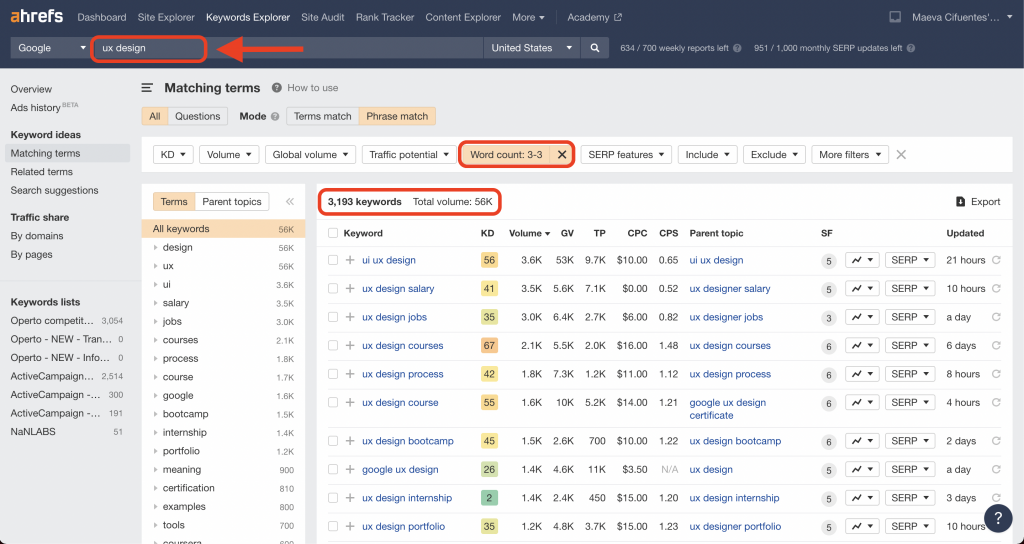
NOTE: Obviously you don’t need to use all 3000+ keywords, this is just to give you an example. You can shorten the list using any keyword metric filters, based on things like your domain’s backlink strength, etc.
SurferSEO also has a content planner tool which suggests clusters to build topical authority around a main topic/keyword.
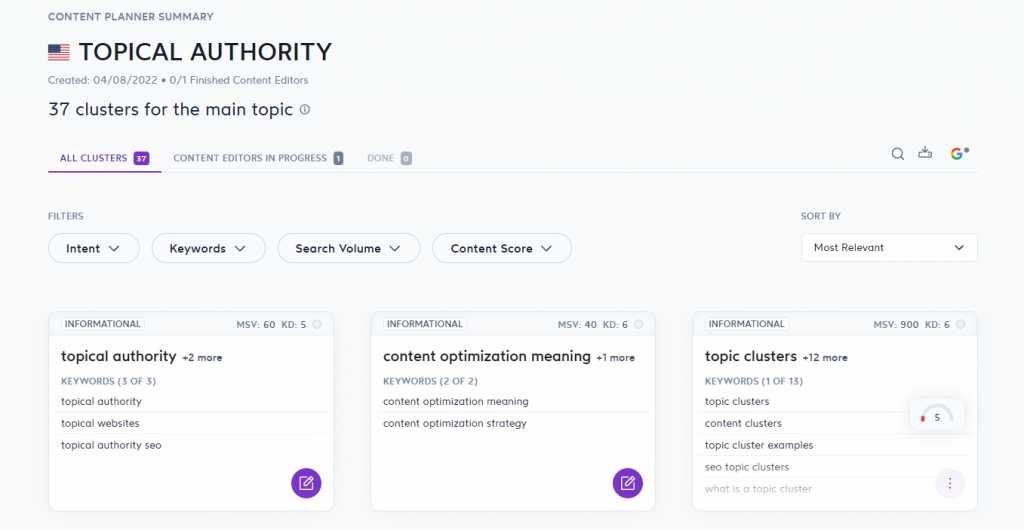
The above were some conventional techniques but you can take it to the next level with things like:
- Communities/forums analysis
- Surveying/interviewing customers
- Surveying/interviewing subject matter experts and literally anything else that’d expand your ideas generation.
There’s no end to the research phase until you’re confident that you’ve covered almost every angle related to this topic.
Once you have all those keywords in a sheet, you need to do 4 main things:
- Filter out all irrelevant ideas (Example: For a design software the keyword “UX design courses” won’t hold value.)
- Cluster the ideas with common search intent (Example: The 2 keywords “UX design tools” and “UX design software” can be clustered under one topic as they represent identical search intent. Meaning you won’t need two separate pages for them).
- Note down the keyword’s corresponding funnel stage (Decide for each keyword, whether it falls into the top, middle, or bottom of the funnel.)
Once all of this is done, you need to give the structure of a cluster to the topic you’re working on, by placing the broadest topic at the center and the rest of the sub-topics (belonging to various funnel stages) around it.
Here’s what it’d look like:
Till now we’ve worked on a single topic cluster. However, if there are multiple domains that you wish to build topical authority in, you need to expand your topical coverage beyond one cluster and do the same thing for other topics.
Soon your website structure will start looking like a single entity with multiple webs of information assembled together:
How does this approach resonate with Google’s algorithm?
Breaking down the same Google patent that we discussed earlier, we know that Google builds category clusters out of the pages found on your website. If we dig the patent down to another level, what it shows is that there are 3 major parts of Google’s URL processing mechanism:
- Crawler: That basically crawls the website
- Clusterizer: That puts the pages into different topically related category clusters
- Publisher: Based on the maturity of the cluster, it approves/rejects clusters and pushes them to SERP.
Now, the more mature a cluster would seem to the publisher, the more chances it would have to make it higher in the SERPs. And what makes a topic cluster mature? You guessed it right, having multiple pages on your website covering the same broad-level topic.
2. Logically structured internal linking
If the content is fire for building topical authority, internal linking is gasoline. One essential element of building topical clusters and putting them together in an SEO-friendly manner is to utilize internal links in a logical order.
In your pursuit of building topical authority on your website, you can utilize internal links to complete different topic clusters (putting the pillar and chapter pages together with links). Taking the same example, of UX design as a topic, the following image shows what the network of a cluster might look like in practice:
The logic behind this practice looks like this:
- Pillar page links to (almost) every chapter page
- Every chapter page links to the pillar page
- The chapter pages link to each other as well
The way these internal links help is way more than building a navigational network among pages. Internal links help search crawlers with two functions:
- Find the relevance among pages.
- Pass the PageRank score onto them.
You might be somewhat familiar with the concept of PageRank which at its core represents the score assigned to pages based on the number of incoming links.
However, another version of the PageRank is Topic-sensitive PageRank which takes into account the topical relevancy of the links overall before assigning the score to the page.
For example, if there are 2 sets of pages, one about politics and the other about sports, topic-sensitive PageRank will be higher when sports-related pages are linking to other sports-related pages, and the same goes for politics.
Both these concepts at the foundational level express a need for logically structured internal links (for passing the PageRank) that are topically relevant (to ensure topic-specificity).
The outcome is Google developing a better understanding of each topic your website is covering and how they’re connected together.
NOTE: There are various Google patents on the subject of Pagerank that can help you understand how Google might make use of internal links however if you’re at a beginner-intermediate level, you can rely on the fundamentals only.
3. Contextual anchor text
The significance of anchor text is undeniable if you’re following SEO best practices in general. And when the objective is building topical authority, its weight would increase further as an element in your strategy.
In general, the advice I’d give would be similar to what Google recommends in its SEO starter guide, which is “Choose descriptive text”. Also, John Mueller has mentioned various times that longer anchor texts can provide better context.
There are just a few practices that you need to follow for pages in a topic cluster:
- Use the targeted keyword as the anchor text for the page, wherever possible, when linking to it from any page (let it be within the cluster or not) on the website.
- Make sure the anchor texts are diverse enough to signal search engines that you’re not spamming out the optimization practice. There is no exact ratio that anyone can suggest though.
- Don’t stress the wording of the anchor text too much provided that both are representing the same exact thing. For example, being confused in two anchors “email marketing tools” or “best email marketing tools” doesn’t make any sense. Google is way more advanced than this stuff (due to its semantic nature).
- When adding variety to your anchor texts, make sure that the anchor text variation isn’t making a shift to the search intent associated with the term.
- Thanks to Google’s advanced NLP technology, it can detect the sentiment within a chunk of text and put the anchor text (and relevancy to the page) within that bucket. For example, if the anchor is detected within content that is referring to a negative experience, the anchor text will be valued with that negative experience in context too. Make sure you’re aware of the context you’re providing to your link anchors.
4. Outgoing (external) links
When you’re creating high-quality content, intentionally as a best practice or unintentionally, you’ll link to other websites from the page. It can be to make references or to share an external resource with your readers etc.
On a macro level, the topical authority of a website as a whole can also be affected by its outgoing links, although as a topical authority factor they hold relatively less weightage than others.
In order to understand how external links can have an impact on topical authority, let’s zoom into what outgoing links result in: CheiRank.
If you’re familiar with Pagerank, you can think of CheiRank as an inverse of it. As Kevin Indig puts it:
What this concept tells us is that similar to PageRank, there’s a score that web pages gain as a result of linking out to other pages.
This doesn’t mean that your pursuit should be to achieve a higher CheiRank. In fact, this would be the worst approach to adopt. The takeaway from this is that having some outgoing links, as long as they’re relevant and make sense for the content, is better than having none.
And on a practical level, all you should do is follow some conventional external linking best practices:
- Link to pages where it makes sense from a topical relevance standpoint.
- Don’t link out, just for the sake of having some outgoing links on the page.
- Ensure at least some reputable/authoritative sources are linked to, in the content.
- Ensure that the links are adding value for the readers too, not just for the crawlers.
How to measure topical authority
Remember topical authority is the “perceived” authority by Google in any subject matter. And since there is no objective scoring provided by Google itself that we can refer to, measuring the authority of your website around specific topics might not be possible in the truest sense.
However, this doesn’t mean that we cannot utilize some self-derived techniques to get some idea of where our website stands from a topical strength’s perspective.
There are two techniques for measuring topical authority that I found credible.
1. Topical authority ratio
Topical authority ratio is a technique, introduced by George Chasiotis from Minuttia, that lets you measure your website’s relevancy to one topic, in relation to the website as a whole.
You can calculate a ratio between the pages that Google has associated with one particular topic to the total number of pages in Google’s indexed. The number you get as an outcome will tell you how strong Google’s perception is of your website for that one topic.
Here’s what the formula looks like:
Let’s take an example to make it crystal clear.
Imagine we want to check how authoritative is Mailshake.com for a topic like “Cold email”. We first check the total number of pages indexed of the website Mailshake.com:
We can see about Then we insert a keyword to the same search operator to see how many pages on this website does Google associate with the term (in this case ‘cold email):
Using the same formula we divide 534 (topic specific indexed pages) by 665 (total indexed pages):
- Topical authority ratio = 534/665
- Topical authority ratio = 0.80
The outcome is to be evaluated against the number 1.0 (closest being the strongest). Thus we can say that the website Mailshake.com is topically authoritative for topics related to “cold email” and would thus rank for them relatively easily.
If we try a topic that’d be totally different to Mailshake’s product like “recruiting” we can expect a much lower topical authority ratio, as the total number of pages on Mailshake’s website indexed for “recruiting” are only 30:
- Topical authority ratio = 30/665
- Topical authority ratio = 0.04
This means if Mailshake is to create pages related to “recruiting” on their website, it’ll have a hard time ranking them, since the domain isn’t authoritative enough in this subject.
In general, this is what the topical authority ratio score would look like on a scale:
2. Traffic share measurement
Another method, introduced by Kevin Indig, that I’ve found rational, is to measure the traffic share of your website against its competitors for the total number of keywords associated with any seed keyword.
For example, If there’s a seed keyword like “ecommerce”, obviously the total number of keywords associated with this one head-term would be thousands. With Ahrefs’ phrase match report, we can see about 182,000 related keywords for “ecommerce” with a total volume of 1.3 million.
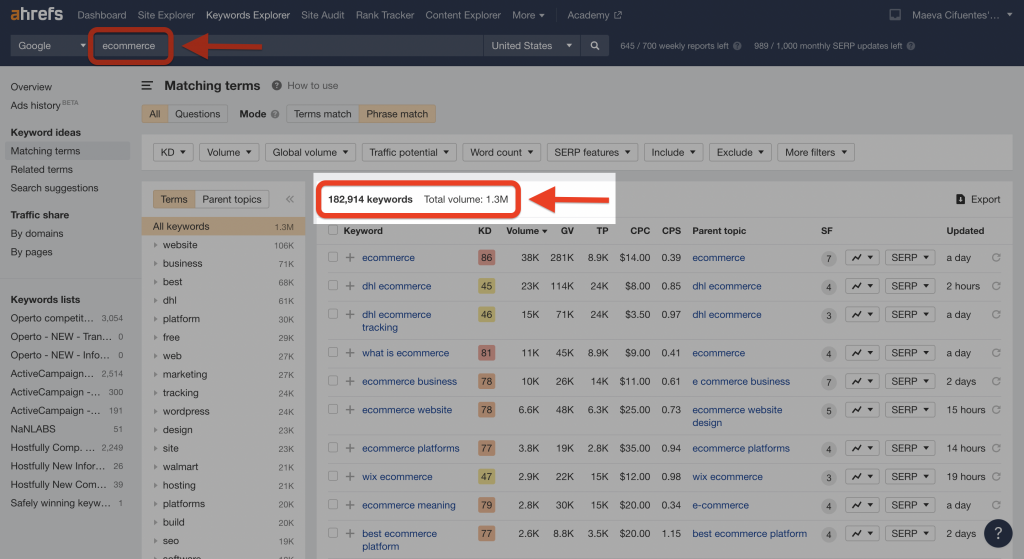
So if we rank websites, in ascending order, by the total traffic they’re generating from these keywords, that’d be a logical measure for topical authority. After all, topical authority is how well you cover all topics associated with a head term (topic).
Now, let’s perform this test by ourselves to make this method crystal clear.
1. Let’s pick “ecommerce” as the head term and put it in Ahrefs
2. Navigate to Ahref’s phrase matching report
3. Filter keywords by the least search volume of 10
4. Export this list of keywords and re-upload it to Ahrefs in bulk
5. Now click on traffic share by domain from the left sidebar
6. There you have it: the websites ranked with traffic share for all the keywords related to the head term.
So in the case of “ecommerce” as the head-term, we can see Shopify is thriving:
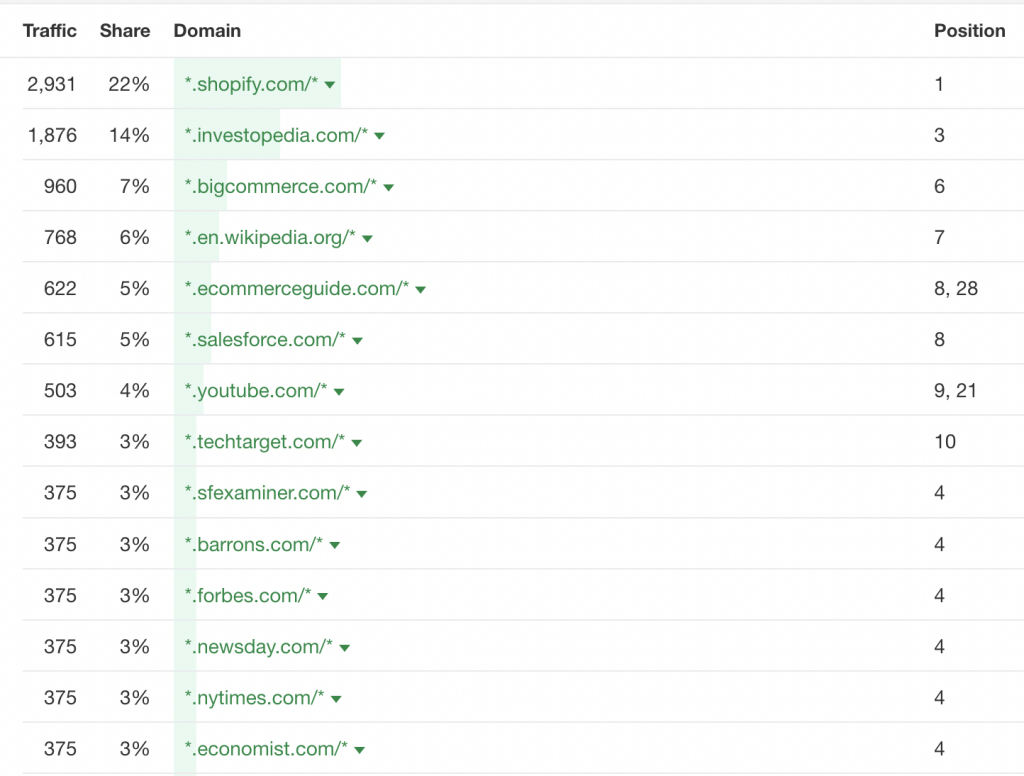
We can also test this for other seed keywords. For example, it looks like MailChimp is dominating the market when it comes to “Email marketing” as the seed topic:
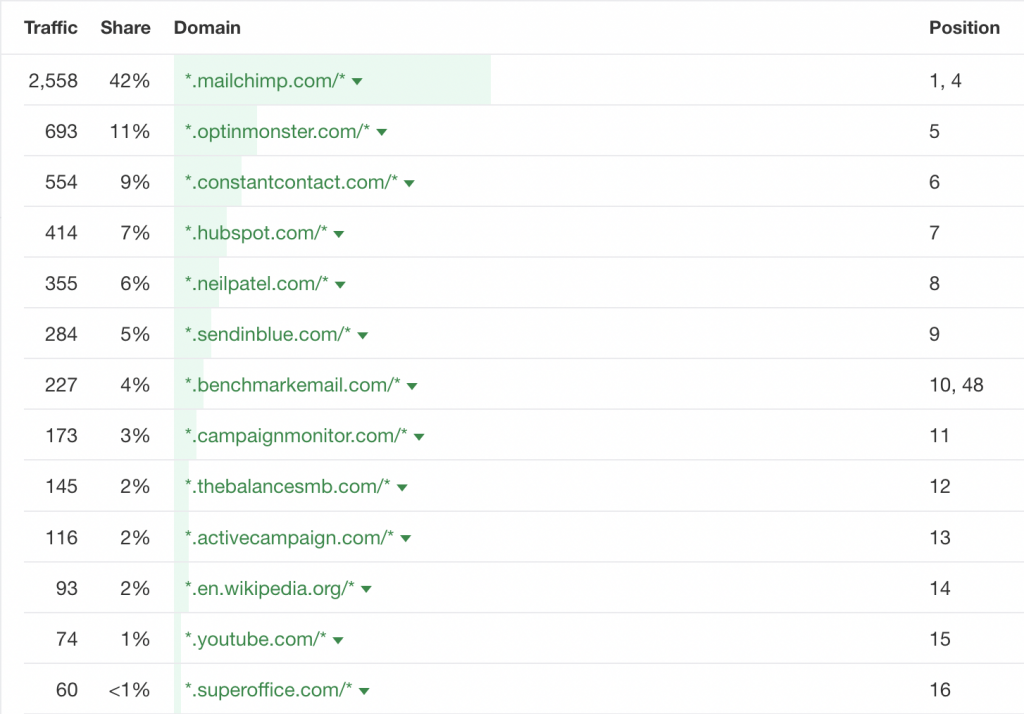
The bottom line is the more traffic share a website gets from the total keywords related to a particular topic, the more authoritative that website would be for that specific topic.
Topical authority case studies to learn from
I won’t be going into the details of the case studies, simply because of the fact that there are so many of them and each one is a gigantic piece of content in itself. However, the outcome some folks have achieved with topical authority is fascinating enough to mention in this article:
From 0 to 300K monthly traffic in 6 months without backlinks
This case study is from ‘Koray Tugberk Gubur’ who is considered a god-level SEO-person with an unbelievable understanding of search engines. He often speaks of topical authority and has leveraged it several times to achieve exponential organic results.
From 0 to millions of monthly organic traffic in 12-16 months
These are multiple projects that Nick Jordan and his team scaled to a new level in just a period of 12-16 months. Again, almost no actively built backlinks neither a lot of investment into technical SEO. From a broader perspective, all they’ve done is covered all angles of the topics that were valuable to their clients and the results are speaking for themselves.
9x Organic search traffic in 10 months without backlinks
I can say with pride that the agency I work at, Flying Cat Marketing, we’ve achieved exponential results in terms of organic search traffic improvement. For a narrow niche where keyword research tools were failing in providing data, we relied on unconventional topic/keyword research techniques to create content that drove these crazy results.
Conclusion
Rankings in a search engine like Google cannot be attributed to one factor in silo. It involves layers of interconnected factors and their weightage as acknowledged by Google itself. However, you’re almost hitting a majority of those signals right when the content on your website is showing signs of topical authority.
Remember, building topical authority doesn’t mean other aspects (technical SEO & link building) are automatically less significant now. What it means is that if you’re doing everything right already, following a holistic topical coverage approach will yield exponential results for you with the same amount of effort.
Google as a semantic search engine can understand topics (or in a more sophisticated language ‘concepts’) way beyond keywords. Thus with every new page being published around a topic, you’re building a snowball effect with the potential of a compounded outcome.
Frequently asked questions about topical authority
What is topical relevance?
Topical relevance is defined as a process that search engines utilize to determine how relevant a page is to a specific topic and particular search queries. Search engines like Google use various factors to evaluate the big chunk of pages they’ve in their index and score them based on their closeness to specific topics. The same score also determines how the pages should be ranked in the search results for any given query.
What is topical optimization?
Topical optimization refers to the idea of optimizing pages for topics rather than keywords. Due to the semantic nature of Google as a search engine, it understands the association of pages with different topics and is not bounded by keywords. In topical optimization (also called semantic SEO) we try to cover topics as extensively as possible.
What is a topical website?
A topical website can be defined as a website that is focused on a particular topic(s). The content on a topical website sticks to a particular subject (or a set of subjects) and tends not to go beyond its boundaries when it comes to topical coverage.
What is semantic web SEO?
Semantic web SEO is the process of building deep and holistic topic clusters on your website so search engines like Google can understand the semantic relevance among pages. This helps present your website as an authoritative source of information to Google and results in better rankings.
